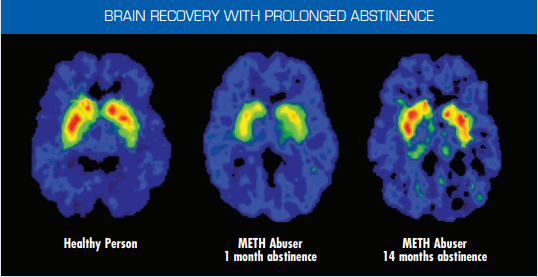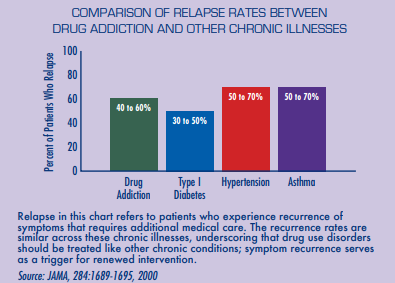Treatment and Recovery
Can addiction be treated successfully?
YES. Addiction is a treatable disease. Research in the science of addiction and the treatment of substance use disorders has led to the development of evidence-based interventions that help people stop abusing drugs and resume productive lives.
Can addiction be cured?
Not always—but like other chronic diseases, addiction can be managed successfully. Treatment enables people to counteract addiction’s powerful disruptive effects on their brain and behavior and regain control of their lives.
Does relapse to drug abuse mean treatment has failed?
No. The chronic nature of the disease means that relapsing to drug abuse at some point is not only possible, but likely. Relapse rates (i.e., how often symptoms recur) for people with addiction and other substance use disorders are similar to relapse rates for other well-understood chronic medical illnesses such as diabetes, hypertension, and asthma, which also have both physiological and behavioral components. Treatment of chronic diseases involves changing deeply imbedded behaviors, and relapse does not mean treatment has failed. For a person recovering from addiction, lapsing back to drug use indicates that treatment needs to be reinstated or adjusted or that another treatment should be tried.
What are the principles of effective substance use disorder treatment?
Research shows that combining treatment medications (where available) with behavioral therapy is the best way to ensure success for most patients. Treatment approaches must be tailored to address each patient’s drug use patterns and drug-related medical, psychiatric, and social problems.
How can medications help treat drug addiction?
Different types of medications may be useful at different stages of treatment to help a patient stop abusing drugs, stay in treatment, and avoid relapse.
- Treating Withdrawal. When patients first stop using drugs, they can experience a variety of physical and emotional symptoms, including depression, anxiety, and other mood disorders, as well as restlessness or sleeplessness. Certain treatment medications are designed to reduce these symptoms, which makes it easier to stop the drug use.
- Staying in Treatment. Some treatment medications are used to help the brain adapt gradually to the absence of the abused drug. These medications act slowly to stave off drug cravings and have a calming effect on body systems. They can help patients focus on counseling and other psychotherapies related to their drug treatment.
- Preventing Relapse. Science has taught us that stress, cues linked to the drug experience (such as people, places, things, and moods), and exposure to drugs are the most common triggers for relapse. Medications are being developed to interfere with these triggers to help patients sustain recovery.
How do behavioral therapies treat drug addiction?
Behavioral treatments help engage people is substance use disorder treatment, modifying their attitudes and behaviors related to drug use and increasing their life skills to handle stressful circumstances and environmental cues that may trigger intense craving for drugs and prompt another cycle of compulsive use. Behavioral therapies can also enhance the effectiveness of medications and help people remain in treatment longer.
|
How do the best treatment programs help patients recover from the pervasive effects of addiction?
Gaining the ability to stop abusing drugs is just one part of a long and complex recovery process. When people enter treatment for a substance use disorder, addiction has often taken over their lives. The compulsion to get drugs, take drugs, and experience the effects of drugs has dominated their every waking moment, and abusing drugs has taken the place of all the things they used to enjoy doing. It has disrupted how they function in their family lives, at work, and in the community, and has made them more likely to suffer from other serious illnesses. Because addiction can affect so many aspects of a person’s life, treatment must address the needs of the whole person to be
successful. This is why the best programs incorporate a variety of rehabilitative services into their comprehensive treatment regimens. Treatment counselors may select from a menu of services for meeting the specific medical, psychological, social, vocational, and legal needs of their patients to foster their recovery from addiction.
For more information on substance use disorder treatment, see Principles of Drug Addiction Treatment: A Research-Based Guide (www.drugabuse.gov/PODAT/PODATIndex.html) and Principles of Adolescent Substance Use Disorder Treatment: A Research-Based Guide (www.drugabuse.gov/publications/principles-adolescent-substance-use-disorder-treatment-research-based-guide).


